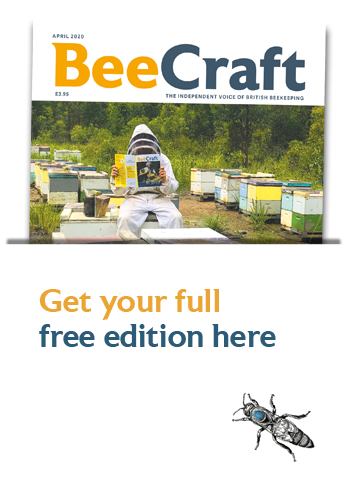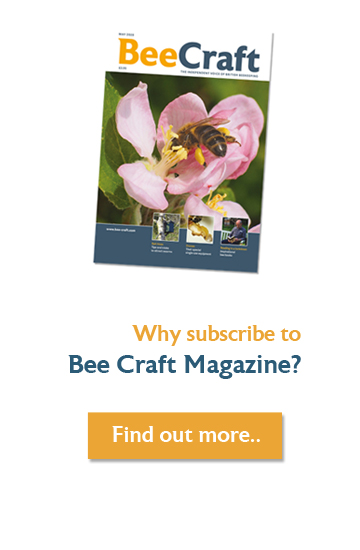This annual competition is sponsored by Jeremy Mogford, owner of Andrew’s favourite hotel in Oxford. With over 1280 entries this year sadly, he says, his quirky slant didn’t sneak in under the radar of Jeremy and the other judges, Pru Leith and Stephen Fry!
Having wanted to take up the hobby for some years, Andrew has now been a beekeeper for 6 years and is a member of a very active and supportive association in Cambridge. He retired some years prior to that from his role as Manufacturing Director for a scientific instrument manufacturing company in Cambridge.
An enjoyable read!

“...............sweeter than wine”
She woke in total darkness, in a tight space, very warm and there was a slightly cloying sweet smell, a faint humming noise – she sensed that she should move upwards.
She came up against a soft material which yielded when she pushed it so she pushed a hole and nibbled it wider with her mandibles. She eased her body out and upwards, into a warm semi-dark space filled with a horde of beings, she looked along her body and realised that she looked like them herself!
Suddenly she “felt” a voice in her head, which said “Welcome – you have emerged at last, your first duty is to clean out the cell which has nourished you for these past days”
She replied “ where am I and who am I?”
“You are one of us – we are bees and our job is to produce the most wonderful food in the world, we are not allowed to keep it all but must share it with the world so that all may appreciate it”
She watched how her neighbours were cleaning out the cells – so she copied them. She had been doing this for a few days when she sensed a small crowd of bees moving slowly towards the cells she had just finished cleaning, she realised that in the centre of the crowd was a bee that was twice as big as the rest – this bee was laying a very small egg into each cell. She instinctively knew this was the Queen who must be obeyed in all things.
The other bees had moved to where earlier eggs had transformed into larvae and were feeding them with “bee bread” – a mixture of pollen, honey and enzymes which they produced themselves. The other bees told her that the larvae would transform into new adult bees in 10 days or so, they would then take over the cleaning of cells and feeding the larvae .
She noticed that the older bees were producing a soft substance, which they moulded into the curiously shaped cells, which surrounded them. Some had eggs in, some larvae and others a wonderful glistening substance that smelled very, very sweet – she checked that none of the bees were watching her and tasted some – it was wonderful – like nothing she could imagine.
The bees all around her had started moving their wings rapidly – she hadn’t realised how hot it had become. She then realised how easy it was to mould the cells with the substance she realised was wax. Some of it had started to soften too much so She started to vibrate her wings and almost at once the air started moving around her and it felt cooler.
Life continued along these lines for nearly three weeks – She learnt several new skills and for a short time was honoured to feed the Queen while some of the others guided the Queen to the next cell, which lacked an egg.
It was always semi-dark in the hive but as night changed to dawn outside - the darkness lessened slightly, then dozens of the bees left the hive, She noticed that they returned bearing several different things – she later learned that these were called nectar, pollen, water and propolis.
One of the older bees motioned her to follow and they launched off the entrance of the hive and she soared into the air – what a wonderful sensation !
She followed the group of bees who suddenly swooped onto some glorious yellow flowers.
She reached into the depths of the flower to some wonderful syrup – she filled herself up with as much as she could hold, as she left with the others – she noticed that some yellow powder had attached to the tops of her legs – she realised that this was the pollen that she had fed to the larvae. She also noticed that when she visited the next flower – some of the pollen stayed in that flower.
When she reached the hive there were bees waiting for them, one of them used her proboscis to remove some of the nectar “mouth to mouth” and transfer it into an empty cell. It took some time to fill up the cell. She noticed that some processing had occurred during the days that this took – She realised that it was thicker and sweeter. The hive was warm as it was summer time and the bees were fanning their wings – She later learned that this was to evaporate some of the water in this liquid, which She discovered was honey. When it was the correct consistency – the bees “capped” the cell with wax, which would preserve the honey.
She found out that the bees would visit 2 million flowers to produce 1 pound of honey and travel 55,000 “bee miles “. A bee might produce half a teaspoon of honey in its lifetime of around 60 days.
The summer continued, the bees gradually filled all the wax frames with honey – She discovered that if She climbed up through the frames – there was another box of frames above where the bees stored more honey.
One day there was a great commotion – loud buzzing and a lot of activity near the entrance of the hive – she rushed down to see what looked like some black and yellow bees attacking the bees guarding the entrance, more and more bees rushed to join the defenders, each time a bee stung the yellows ( later she learned they were wasps) the bee died as its lance stayed in the wasps body whereas the wasps could sting repeatedly . In the end the numbers won – the hive could have 50,000 bees in the hive at night and not all were out foraging at any time.
Some days it poured with rain and the bees could not fly in the rain as their wings would be damaged, when this occurred – the bees consumed some of the stored honey to keep up their strength. If it was too thick for them to digest – they gathered water where it had condensed on the walls of the hive and thinned the honey.
If the wind was cold and there were gaps between the “boxes” which comprised the hive – the bees would fill the gaps with a sticky substance called propolis which they had harvested – mostly sap from trees, very efficient “bee-glue”.
One day in late summer the hive experienced a violent shaking and suddenly filled with light – the roof had been removed ! The Queen hates the light and quickly moved down in the hive to the lowest “box” of the hive (the honey stores being in the upper boxes) to conceal herself.
Suddenly smoke filled the hive – “it must be a forest fire” the bees thought – “we must flee to safety” , so the bees quickly filled their stomachs with honey and prepared to flee to find a new home but soon it got dark again – the roof was back in its place so no need to leave after all ! They noticed that some frames of honey had gone !
The buzzing in the hive was deafening but gradually calmed down. Some bees left to go foraging and others resumed their normal duties.
Just before dusk the roof was removed again and the missing frames returned – but without the honey! All cells were open and very sticky.
The bees rapidly started removing the traces of honey – transferring it to nearby cells and repairing any damage to the empty cells.
Not all the honey had been taken, there was sufficient left to maintain the colony of bees through the winter when the weather and lack of nectar etc. would confine the colony to the hive until the spring.The older bees would die off and the young bees produced for the winter were of a different metabolism, had more body fat and would take very little exercise until the spring and so would live longer.
She was feeling tired – she knew she was reaching the end of her time but felt she had done her bit for everyone – produced some of the finest food in the world which her ancestors have been producing for centuries and hopefully those who came after her would continue to do so for ever.
Andrew McKeown
2019




